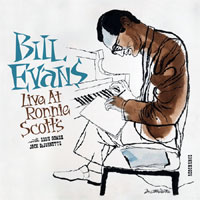Bill Evans • Live at Ronnie Scott's
 ill Evans' 1950s
recordings on the Riverside label, which include Waltz for Debby and Live at
the Village Vanguard, are justifiably revered, but they overshadow his recordings for
Verve in the 1960s, during which he continued his exploration of the piano-trio landscape.
One of my faves on Verve is California Here I Come, from 1967, a time when jazz
aesthetics were in flux, pushed on one side by atonality and pulled on the other by rock
'n' roll. This set captures Evans in a more rhythmic, driving mood than usual, backed by
Eddie Gomez on bass and "Philly" Joe Jones on drums. The trio plays a number of
standards, a couple of which -- "Alfie" and "Round Midnight" -- made
famous by other jazz icons, Sonny Rollins and Thelonious Monk, whose early albums are as
revered as those of Evans. ill Evans' 1950s
recordings on the Riverside label, which include Waltz for Debby and Live at
the Village Vanguard, are justifiably revered, but they overshadow his recordings for
Verve in the 1960s, during which he continued his exploration of the piano-trio landscape.
One of my faves on Verve is California Here I Come, from 1967, a time when jazz
aesthetics were in flux, pushed on one side by atonality and pulled on the other by rock
'n' roll. This set captures Evans in a more rhythmic, driving mood than usual, backed by
Eddie Gomez on bass and "Philly" Joe Jones on drums. The trio plays a number of
standards, a couple of which -- "Alfie" and "Round Midnight" -- made
famous by other jazz icons, Sonny Rollins and Thelonious Monk, whose early albums are as
revered as those of Evans.
The music on California Here I Come was recorded at the Village Vanguard in August 1967; Evans played at Ronnie's Scott's London jazz club in June 1968. So California Here I Come and Live at Ronnie Scott's are both live sets recorded within a year of each other, but neither was released around the time it was recorded. California Here I Come appeared on LP in 1982 and CD in 2004. Live at Ronnie Scott's didn't see the light of musical day until late 2020. On both, Evans played with his usual bassist of the period, Eddie Gomez, but Jack DeJohnette, who gained renown for his work in Keith Jarrett's trio, was on drums for Live at Ronnie Scott's. This slight change was crucial to the recording, because the tapes come from DeJohnette's personal collection; without him, this music would likely be lost to history. "Alfie" and "Round Midnight," along with a handful of other numbers, occur on both recordings, but notable additions to Live at Ronnie Scott's are Evans' own "Waltz for Debby" and Miles Davis's "Nardis," a great banger with which to close the set. The similarities and differences are interesting, but as with any Evans recording, it was the pianist's abundant lyricism that carries the day. The interplay with Gomez on "Embraceable You" is close to telepathy, and DeJohnette, also an accomplished pianist, weaves around Evans' delicate lines with supple deftness. One of the things that fascinates me most about live jazz is its aesthetic instantaneousness and the way this influences the instrumental voicing. I also wonder how much the playing is affected by the mood of the musicians in that moment, and even the personality of the audience. Live at Ronnie Scott's doesn't answer these questions, but it does reveal that this trio is in its element, so engaging and intimate is the music. It's clear that this recording was never meant to be released. First, it's in mono, even though it was made well into the stereo era; second, there is background hiss, noticeable mostly at the beginning of each cut. The overall fidelity is good, however, with each instrument well delineated. The sound is sprightly and light, skewed toward the upper midrange and treble, more about the separation of the instruments than their weight or impact. George Klabin, the founder of Resonance Records, and co-president Zev Feldman, aka “the Jazz Detective,” have been dedicated to discovering, supporting and recording new artists from around the world, but their real passion seems to be unearthing little-known and previously unreleased materials from jazz legends, giving each historic recording the full audiophile treatment. This is the third from Evans that the label has released, each initially on vinyl (which sells out quickly) and then on CD. The 180-gram LPs were pressed at RTI and housed in rice-paper sleeves. Bernie Grundman, who has resurrected so many important recordings, did the mastering. Also part of the package is a large-format booklet featuring interviews, including with Chick Corea and Chevy Chase. A nod to classic jazz, the cover art comes from renowned illustrator David Stone Martin, from "a never-before-published, one-of-a-kind lithograph." It celebrates the artist's work on so many 1940s and 1950s LP covers for the Verve, Cleff and Norgran labels. The package here befits the music, but it is the music
that speaks loudest. The 7000 vinyl copies are sold out, but the two-CD set, which sounds
as good as the LPs, makes it still possible to add this previously buried gem to your
Bill Evans shelf. |
